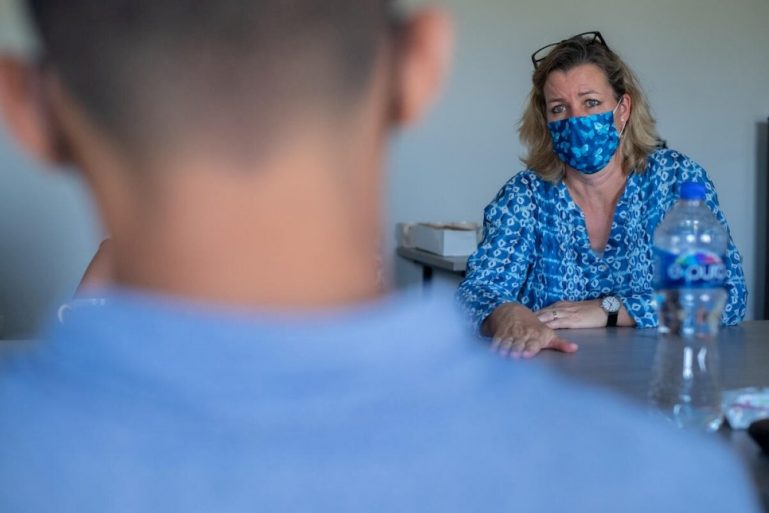
UN Deputy High Commissioner for Refugees Kelly T. Clements speaks with a young Honduran asylum-seeker. © UNHCR/Jeoffrey Guillemard
In Central America, she visited communities forced to live under the threat of criminal gangs, and met families who fled their homes due to violence and persecution, compounded by extreme poverty, climate and the COVID-19 pandemic. Throughout the trip, Clements also met with senior government officials, civil society partners and business leaders, with whom UNHCR, the UN Refugee Agency, has joined forces to find effective ways to help people on the move.
“I had a chance to talk to people who were literally fleeing for their lives, escaping violence, extortion, recruitment and rape by gangs and other criminal groups,” Clements said. “Gender-based violence is particularly serious in the region where so many women and children are suffering unspeakable violence.”
Clements also heard from community organizations which, together with UNHCR, help to counter the effects of violence. “I was so impressed with the work these groups do and the passion and commitment they show to their communities,” she said.
Clements was also able to see efforts to provide protection and solutions to people who cross international borders, and the network of civil society-run shelters that welcome them. Mexico and, to a lesser extent Guatemala, are home to a growing number of asylum-seekers and refugees. UNHCR has redoubled support to the asylum and child protection authorities in both countries. In Mexico, which is on track to surpass the 70,000 asylum claims it received in 2019, UNHCR has also expanded its refugee integration programme, which includes relocation and job matching that has benefitted close to 10,000 people since 2016. Guatemala, which has seen an 88% increase in asylum applications, has expanded its reception and processing capacity with UNHCR support.
But more international support is needed, Clements said.
“Up to a million people in Central America have been forcibly displaced. It is the responsibility of the world community and of all of us to help those people rebuild their lives,” she said. “The first step for all countries is to guarantee access to asylum for the people whose lives depend on it.”
Clements also stressed the importance and need for greater financial and technical support to those governments and organizations working together to provide humanitarian aid and protection to people on the move in Central America and Mexico. “This need has never been more urgent,” she said.
Seven countries of origin, transit and asylum from the region: Belize, Costa Rica, El Salvador, Guatemala, Honduras, Mexico and Panama, are working together to address these challenges under the Comprehensive Regional Protection and Solutions Framework, known as MIRPS, a solutions-oriented, state-led initiative. Next month, Spain will host a solidarity event to garner international support of these countries and their efforts.
